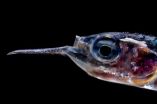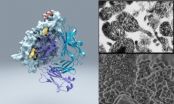Smithsonian reports GMO soybean pollen threatens Mexican honey sales
2014-02-07
(Press-News.org) Mexico is the fourth largest honey producer and fifth largest honey exporter in the world. A Smithsonian researcher and colleagues helped rural farmers in Mexico to quantify the genetically modified organism (GMO) soybean pollen in honey samples rejected for sale in Germany. Their results will appear Feb. 7 in the online journal, Scientific Reports.
David Roubik, senior staff scientist at the Smithsonian Tropical Research Institute, and colleagues developed the ability to identify pollen grains in honey in Panama and in Mexico during the 1980s and 1990s when they studied the effects of the arrival of Africanized bees on native bees. "Nobody else can do this kind of work in the 'big field' environment and be confident that what they are seeing are soybean pollen grains," said Roubik. They found that six honey samples from nine hives in the Campeche region contained soy pollen in addition to pollen from many wild plant species. The pollen came from crops near the bee colonies in several small apiaries.
Due to strict European regulations, rural farmers in the Mexican Yucatan face significant price cuts or outright rejection of their honey crop when their product contains pollen from GMO crops that are not for human consumption. The regional agricultural authorities, furthermore, seemed unaware that bees visited flowering soybeans to collect nectar and pollen.
"As far as we could determine, every kind of GMO soybean grown in Campeche is approved for human consumption," said Roubik. "But honey importers sometimes do no further analysis to match GMO pollen grains with their source."
To test the honey for GMO pollen, researchers from the Smithsonian, El Colegio de la Frontera Sur la Universidad Autonoma de Yucatan and el Instituto Nacional de Investigaciones Forestales, Agropecuarias y Pecuarias sent the nine samples to Intertek laboratory in Bremen, Germany, for genetic analysis. Two samples tested positive for GMO pollen.
"We cautiously interpret these results as significant for elsewhere in Mexico where some five times the GMO soy grown in Campeche is found and beekeeping is alive and well, not to mention the rest of the world," said Roubik. "Bee colonies act as extremely sensitive environmental indicators. Bees from a single colony may gather nectar and pollen resources from flowers in a 200-square-kilometer area. With an economy based on subsistence agriculture associated with honey production, the social implications of this shift in the status of honey are likely to be contentious and have profound implications for beekeeping in general."
INFORMATION:
The Smithsonian Tropical Research Institute, headquartered in Panama City, Panama, is a unit of the Smithsonian Institution. The Institute furthers the understanding of tropical nature and its importance to human welfare, trains students to conduct research in the tropics and promotes conservation by increasing public awareness of the beauty and importance of tropical ecosystems. Website: http://www.stri.si.edu.
Reference: Villanueva-Gutiérrez, R., Echazarreta-González, C., Roubik, D.W., Moguel-Ordóñez, Y.B. 2014. Transgenic soybean pollen (Glycine max L.) in honey from the Yucatan peninsula, Mexico. Scientific Reports. Online. END
ELSE PRESS RELEASES FROM THIS DATE:
Fish biomass in the ocean is 10 times higher than estimated
2014-02-07
With a stock estimated at 1,000 million tons so far, mesopelagic fish dominate the total biomass of fish in the ocean. However, a team of researchers with the participation of the Spanish National Research Council (CSIC) has found that their abundance could be at least 10 times higher. The results, published in Nature Communications journal, are based on the acoustic observations conducted during the circumnavigation of the Malaspina Expedition.
Mesopelagic fishes, such as lantern fishes (Myctophidae) and cyclothonids (Gonostomatidae), live in the twilight zone of the ...
'Steak-knife' teeth reveal ecology of oldest land predators
2014-02-07
The first top predators to walk on land were not afraid to bite off more than they could chew, a University of Toronto Mississauga study has found.
Graduate student and lead author Kirstin Brink along with Professor Robert Reisz from U of T Mississauga's Department of Biology suggest that Dimetrodon, a carnivore that walked on land between 298 million and 272 million years ago, was the first terrestrial vertebrate to develop serrated ziphodont teeth.
According to the study published in Nature Communications, ziphodont teeth, with their serrated edges, produced a more-efficient ...
Study reveals record rise in insulin use
2014-02-07
"Understanding the pattern of insulin use is limited by a lack of data characterising the prevalence of insulin use in the UK," according to Craig Currie, Professor of Applied Pharmacoepidemiology at Cardiff University's School of Medicine, who led the study alongside colleagues from the University of Bristol.
"Given the limitations, our study sought to calculate – for the first time – the best possible estimate of the rates of insulin for type 1 and type 2 diabetes."
In this retrospective study the team examined the number of patients receiving prescriptions for ...
Rett syndrome genetic variants now available for advance testing, diagnosis & research
2014-02-07
Philadelphia, PA, February 7, 2014 – Despite the identification of gene mutations in methyl CpG binding protein 2 (MECP2) being linked to Rett syndrome (RS), research has been hindered by the lack of commercially available reference materials. Through collaboration between the Centers for Disease Control and Prevention (CDC) and members of the clinical-laboratory and non-profit–research communities, 35 DNA samples containing many common RS genetic variants have now been characterized and made publicly available, eliminating a major stumbling-block for investigators and ...
New guidelines for reducing stroke risks unique to women
2014-02-06
For the first time, guidelines have been developed for preventing stroke in women.
"If you are a woman, you share many of the same risk factors for stroke with men, but your risk is also influenced by hormones, reproductive health, pregnancy, childbirth and other sex-related factors," said Cheryl Bushnell, M.D., M.H.S., author of the new scientific statement published in the American Heart Association journal Stroke.
The guidelines outline stroke risks unique to women and provide scientifically-based recommendations on how best to treat them, including:
Women with a ...
Cholesterol plays a critical role in hantavirus infection
2014-02-06
Viruses mutate fast, which means they can quickly become resistant to anti-viral drugs. But viruses also depend on proteins and nutrients provided by their hosts, and therefore one strategy to identify new anti-viral drugs is to identify and target such host-cell components. A paper published on February 6th in PLOS Pathogens reports that proteins involved in the regulation of cholesterol are essential for hantavirus entry into human host cells.
There are only about 30 known human cases of hantavirus infection in the US per year (with the 2012 cluster in Yosemite National ...
Toxin in seafood causes kidney damage in mice at levels considered safe for consumption
2014-02-06
Washington, DC (February 6, 2014) — A chemical that can accumulate in seafood and is known to cause brain damage is also toxic to the kidneys, but at much lower concentrations. The findings, which come from a study appearing in an upcoming issue of the Journal of the American Society of Nephrology (JASN), suggest that officials may need to reconsider what levels of the toxin are safe for human consumption.
The world's oceans contain algae that produce certain chemicals that can be harmful to humans and other living creatures. Many of these chemicals are considered neurotoxins ...
Acute kidney injury may be a risk factor for later heart problems
2014-02-06
Washington, DC (February 6, 2014) — Patients who experience abrupt kidney injury following surgery have an increased risk of later developing heart problems, according to a study appearing in an upcoming issue of the Journal of the American Society of Nephrology (JASN). The findings suggest that properly treating and monitoring patients with acute kidney injury (AKI) could help protect their heart health.
AKI, an sudden decline in kidney function, is an increasingly prevalent and potentially serious condition in hospitalized patients. Sometimes acute kidney injury arises ...
Reduce the chloride to restore the switch
2014-02-06
This news release is available in French. A drug given to pregnant mice with models of autism prevents autistic behavior in their offspring, a new report shows, and though the drug could not be administered prenatally in humans (there is no way to screen for autism in human fetuses), clinical trials of this drug administered later in development, in young children who have already developed autistic symptoms, are showing progress.
The causes of autism spectrum disorder, or ASD, are complex and not well understood.
Prolonged excitation of brain neurons seems partly ...
The ultimate decoy: Scientists find protein that helps bacteria misdirect immune system
2014-02-06
LA JOLLA, CA—February 6, 2014—A team led by scientists at The Scripps Research Institute (TSRI) has discovered an unusual bacterial protein that attaches to virtually any antibody and prevents it from binding to its target. Protein M, as it is called, probably helps some bacteria evade the immune response and establish long-term infections.
If follow-up studies confirm Protein M's ability to defeat the antibody response, it is likely to become a target of new antibacterial therapies. The protein's unique ability to bind generally to antibodies also should make it a valuable ...



